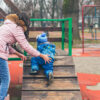Develop self-control
Help your child express his emotions in words, especially negative ones. By using language, he won’t have the need to throw out all his anger or sadness or fear in violent or impulsive behavior! Next, encourage the child to find his own resources for dealing with a given negative emotion, to find his own strategies without telling him what to do. He will gain both awareness of his emotion while keeping behaviors within limits to respect others and himself.
It is normal to feel these emotions and your child needs to know that you do too. The most important step is to recognize that emotion, to welcome it without judging it! Children need both to be understood and to feel that you feel the same emotions as them, at different times in life. If he sees that you are angry with someone and he is right, tell him, he will gain confidence in his own ability to understand himself and others.
A game to develop self-control is the game of silence. The only rule: don’t make noise and don’t talk. Maybe do it during the moments when you need to be quiet, like the first time in the library looking for new books to read together! The one who can keep the noise down wins!
What to do?
If the child doesn’t want to do their homework, the helicopter mom/dad will do it for them and they won’t learn the consequences of their actions and there will always be this problem. It is more comfortable that way for the child but it is not productive.
Overprotection is different from protection: divide what are the dangers (that you need to protect him from) from what are the good challenges that the child can face on his own! The child will learn that even in the face of failure, with his own effort and skill he can pick up the situation and be successful!
If the child falls, evaluate whether he is crying because he really hurt himself or because he was scared: ask him and face the fright with him, without devaluing him, or the pain. Be disposed to emotionally welcome him when he peels his knee without, however, investing him with overprotection. This will allow, in the future, to know that you are there emotionally to listen to him when he is well.



